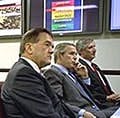The FBI is once again warning terrorists might try to poison food or water supplies. Senior bureau officials said Thursday that al-Qaida is determined to attack Americans at home, even though the organization appears to have a relatively small U.S. presence.
Associated Press writer Curt Anderson reports that the FBI has not detected any individuals or cells actively planning attacks such as those almost two years ago that killed some 3,000 people in New York, Washington and Pennsylvania. Most al-Qaida operatives in the United States provide logistical support such as travel documents, recruitment and fund raising, according to Larry Mefford, the FBI's chief counterterrorism official.
"My view is, it's very small but it does exist," Mefford said of al-Qaida's U.S. presence. "Our concern continues to be what exists in the United States that we're not aware of."
Separately, the Homeland Security Department is advising federal, state and local security officials to evaluate their security procedures in the run-up to the anniversary of the Sept. 11 attacks, but said current intelligence does not warrant an increase in the national threat warning.
The current code yellow alert, signifying an elevated risk of terrorist attack, is the middle level on the five-color scale.
The Homeland Security advisory, issued Thursday evening, says, "We remain concerned about al-Qaida's continued efforts to plan multiple attacks against the U.S. and U.S. interests overseas." It adds that they have no specific information on individual targets or dates for any attack.
Recent arrests of senior al-Qaida members appear to have slowed some of their operational planning, the advisory says.
However, it notes that al-Qaida operatives remain determined to conduct an attack similar to the Sept. 11 strikes, using hijacked aircraft as missiles.
The FBI's Mefford said al-Qaida remains America's most dangerous terrorist foe because of the group's tenacity, patience and willingness to use tactics, including weapons of mass destruction, that demonstrate "they have no inhibitions and they have no rules."
The Homeland Security advisory says intelligence indicates operatives may try to hijack flights that fly near, but not into, the United States, so they will not have to pass the increasingly stringent requirements to board a U.S.-bound flight.
It also warns of truck bombs at infrastructure targets – such as power plants, petrochemical facilities, transportation hubs, dams, food distribution centers and water treatment facilities. Lightly protected targets such as restaurants, hotels and apartments are also possible targets.
Terrorists also may try unusual approaches to artfully conceal suicide devices, the advisory said. "Male bombers may dress as females in order to discourage scrutiny."
The FBI's latest weekly bulletin to state and local law enforcement agencies cautions terrorists might use two naturally occurring toxins – nicotine and solanine – to poison U.S. food or water supplies. Nicotine is found in tobacco plants and solanine in potatoes that are old or have been exposed to sunlight for a long time.
The bulletin, obtained Thursday by The Associated Press, says that terrorist manuals and documents recovered at al-Qaida sites in Afghanistan contain references to use of both substances as poisons.
The FBI said there are no known uses of either toxin by al-Qaida or other Islamic extremist groups, and there is no intelligence indicating such an attack is imminent. However, the bulletin noted a Michigan man pleaded guilty in May to lacing 250 pounds of ground beef with an insecticide containing nicotine, sickening 92 people, in an attempt to get a supermarket co-worker in trouble.
Such lone offenders, whether al-Qaida sympathizers or domestic criminals, are a concern to the FBI because they are so difficult to detect. But Mefford said the FBI's main focus is on tracking known al-Qaida operatives in the United States to gather intelligence on their contacts and intentions.
Mefford told reporters that the FBI's strategy is to keep known al-Qaida operatives under surveillance for as long as possible and document any criminal or immigration violations they commit. The FBI can then arrest the individuals at a moment's notice to disrupt or prevent terrorist operations from going forward.
"We may develop beneficial intelligence information from watching that group operate, or it may be at a point where we need to disrupt that activity," Mefford said. "That's a judgment call we will make tactically."
The FBI bulletin said there is no intelligence indicating that al-Qaida is planning an attack to coincide with next week's two-year anniversary of the Sept. 11 terror attacks. Al-Qaida, the bulletin said, is not known for using such anniversaries for its attacks, preferring surprise.
Yet Mefford said history is not necessarily a guide.
"They're a very flexible organization," he said. "Clearly, they have the ability to change and adapt to their environment, and that's what we're seeing today – they're evolving."
Source: The Associated Press


